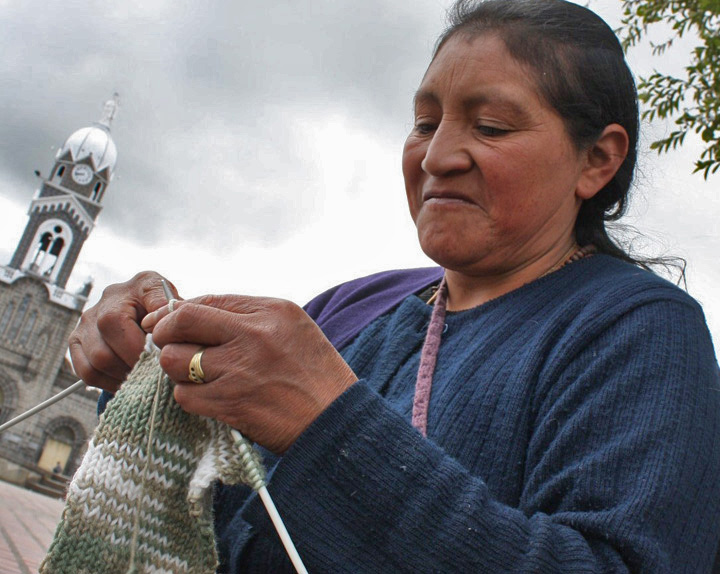

Weaving peace in Colombia

"I tell women that we’ve organized, that we are no longer the women we were before -- that because of machismo, we were kept back, but now that’s no longer the case. Thanks to the training we received, and to believing in all that we are capable of, we have finally lost our fear.”
Luz Marina Colimba’s hands fly as she knits a scarf and tells her story, the story of a Colombian peasant transformed by an MDG-F-funded programme to empower women and build peace in the border province of Nariño.
"These same hands that weave now have raised children and grandchildren, have plowed the land, and even now they are not only knitting scarves but also weaving peace and writing new stories for me as a woman and for my community."
Nearly a third of Colombians are poor and one in ten live in extreme poverty, a fact which particularly impacts women in a country where large gaps in economic and social equality are an obstacle to development and peacebuilding.
The UN joint programme "Strengthening local capacities for peace-building in the Department of Nariño” targets municipalities on the Pacific Coast and in the Andean zones of the Department of Nariño, a region with a high prevalence of violence and poverty and a concentration of illicit crops. Its goal is to promote peace-building and development by strengthening democratic institutions, fostering civic participation and promoting coexistence and sustainable socio-economic development.
The “chagra”
In Luz Marina Colimba’s community the programme works on gender equality, peacebuilding and food security, including strengthening agricultural practices and reviving heirloom seed crops.
In particular, the programme has helped Luz Maria and her neighbors cultivate chagras, which are glades in the forest used to plant herbs for medicinal and ritual use. The chagras, typical of indigenous communities in the area, represent a unique opportunity to recover ancestral knowledge and build food independence for farm families, while strengthening the community’s social fabric.
"With a chagra, we have food security, good health and the ability to feed ourselves in a way that is quick, easy and self-sufficient,”says Ana María Cuerpumal, a peasant whose chagra has become not only a livelihood for her family, but also a space to gather and work together in close contact with the earth.
“I don’t worry about what to cook anymore, because I have more options, more vegetables, and even if someone gets sick I can find the plant they need, thus helping my family and my community."
Luz Marina highlights another benefit of the programme, which has helped establish more than 500 chagras. "We've also worked on something very important, which is to believe in ourselves. Just as they have helped us cultivate the land, they have helped us to strengthen our core, and our relationship with our husbands and with Mother Nature. "
Ancestral seeds
One of the great contributions of the programme has been reviving the tradition of planting ancestral seeds, a practice that had been lost with the passage of time.
Currently Luz Maria plants her chagra with potato and beans, and native foods like majúas, hoyocos, and arracachas, as well as herbs and medicinal plants. She also raises guinea pigs, a local delicacy. This kind of bounty enables Luz Maria and other like her to be food self-sufficient, and has also contributed to the tradition of food barters or "puyuacas,” where indigenous communities meet and exchange food.
"The nicest thing was that neighbors organized to meet and share ideas (...) Before, these meetings didn’t happen or had been lost. But once you exchange an idea, you build confidence amongst yourselves, and so we’ve become brothers and sisters around a communal pot, " says Luz Maria.
The joint programme has also strengthened the social fabric through "mindalas," a way of preserving knowledge and traditional practices, recovering ancestral seeds and introducing agricultural practices into hunter-gatherer communities.
"This is a job for the whole family and I hope that in the future my children and grandchildren continue farming and reviving our heritage seeds. The best way to do this is as I do, by example," says Ana Maria.
Building peace through food security and gender equality
The joint programme "Strengthening local capacities for peace-building in the Department of Nariño” is a collaboration between the Colombian government and five agencies of the United Nations (FAO, UNDP, UNICEF, UNHCR and UN Women) that aims to combat poverty and reduce inequalities in Colombia.
Among other initiatives, the joint programme has improved food security through the establishment of 509 chagras, and has conducted workshops for some 300 women in specialized Gender Training Schools.
By increasing food security and independence and promoting gender equity, the joint programme aims to diminish the inequalities that foster conflict, and to build peace based on people’s recognition and exercise of their rights. It is part of the MDG-Fund's work to help countries achieve the anti-poverty Millennium Development Goals, with a particular focus on the world's poorest people.